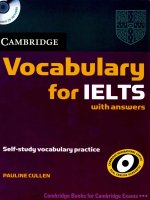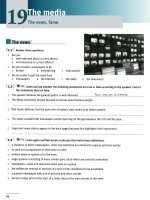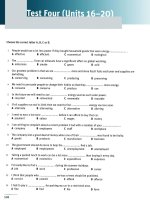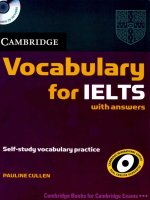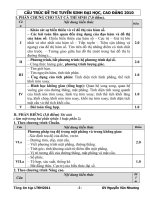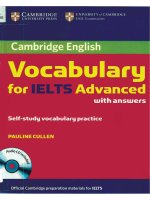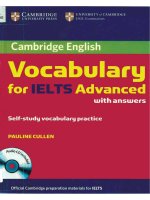Cambridge Vocabulary for IELTS
Bạn đang xem bản rút gọn của tài liệu. Xem và tải ngay bản đầy đủ của tài liệu tại đây (86.01 MB, 178 trang )
CAMBRIDGE
Vocabularu
for IELTS
with answers
Self-study vocabulary practice
PAULINE CULLEN
Cambridge Books for Cambridge Exams eee
Cambridge
Vocabulary
for
IELTS
with answers
Self-study vocabulary practice
PAULINE CULLEN
a) CAMBRIDGE
UNIVERSITY PRESS
CAMBRIDGE UNIVERSITY PRESS
Camrbridge, New York, Melbourne, Madrid, Cape Town, Singapore, São Paulo, Delhi
Cambridge University Press
The Edinburgh Buuding, Cambridge CB2 8RU, UR
www.cambridge.org
Information on this title: www.cambridge.org/9780521709750
© Cambridge University Press 2008
This publication is in copyright. Subject to statutory exception
and to the provisions of relevant collective licensing agreements,
no reproduction of any part may take place without the written
permission of Cambridge University Press.
First published 2008
Printed in the United Kingdom at the University Press, Cambridge
A catalogue record for this publication is available from the British Library
ISBN-13 978-0-521-70975-0
Introduction
IELTS Test summary
fF NS
oon
Map of the book
Unit1
Unit 2
Unit3
Unit 4
Unit5
Test One
Growing up
Mental and physical development
Keeping fit
Lifestyles
Student life
Unit6 ~—
Unit7
Unit 8
Unit9
Unit 10
Test Two
Effective communication
Onthe move
Through the ages
Thenatural world
Reaching for the skies
32
38
42
46
52
56
Unit 11
Unit 12
Unit13
Unit14
Unit15
Test Three
Design and innovation
Information technology
The modern world
Urbanisation
The green revolution
58
64
68
72
78
82
Unit16
Unit17
Unit18
Lnit19
Unit 20
Test Four
The energy crisis
Talking business
The law
The media
The arts
84
90
94
98
102
108
Unit21
Unit 22
Unit 23.
Language building 1
Language building 2
Academic Writing Task 1
Unit 24
Academic Writing Task 2
Unit 25 General Training Writing Tasks
1 and 2
Test Five
110
114
118
122
126
130
Answer key
132
Recording scripts
157
Wordlist
167
Acknowledgements
173
CO Tracklist
174
16
22
26
30
Test practice
Unit number
Title
Unit1
Growing up
Relationships, families and
early learning
Listening Section 1
Unit 2
Mental and physical
development
The body, the mind
Speaking Part 2
General Training Writing Task 1
Unit 3
Keeping fit
Diet, health and exercise
Academic Reading
Unit 4
Lifestyles
Life, leisure
Listening Section 2
Unit 5
Student life
Study, education, research
General Training Reading Section 2
Unit 6
Effective communication | Language, linguistics
Academic Reading
Unit 7
On the move
Tourism, travel
General Training Reading Section 1
Unit 8
Through the ages
Time, history
Listening Section 4
Unit 9
The naturat world
Flora and fauna, agriculture
Unit 10
Reaching for the skies
Space, the planets
Listening Section 3
Unit 11
Design and innovation
Building, engineering
Academic Reading
Unit 12
Information technology
Telecommunications,
computers and technology
Speaking Parts 1, 2, 3
Unit 13
The modern world
Globalisation, changing
attitudes and trends
Academic Writing Task 1 (describing a
chart)
Unit 14
Urbanisation
Problems and solutions, big | Academic Reading/
city life
General Training Reading Section 3
Unit 15
The green revolution
The environment, climate
change and pollution
| Academic Reading /
General Training Reading Section 3
Academic Writing Task 1 (describing a
process)
Map of the book
Unit number
Title
Topics
Test practice
Unit 16
The energy crisis
Natural resources,
alternative fuels
Academic Reading
Unit 17
Talking business
Employment, management
and marketing
General Training Writing Task 1
Academic Writing Task 2
Unit 18
The law
Crime, punishment
General Training Writing Task 2
Unit 19
The media
The news, fame
Academic Writing Task 2
Unit 20
The arts
Art appreciation, the
performing arts
Academic Reading
Unit 21
Language building 1
Using a dictionary, word families
Unit 22
Language building2
Learning vocabulary, collocation
Unit 23
Academic Writing Task 1
Data, graphs and tables, diagrams and processes
Unit 24
Academic Writing Task 2
Linking words, opinion words, register
Unit 25
General Training Writing
Vocabulary for Writing Tasks 1 and 2
C2
Reference section
What does the book aïm to do?
It aims to extend and improve the accuracy of your
vocabulary and help you prepare for the IELTS test. It
introduces vocabulary through listening and reading texts
that reflect the materials used in the JELTS test. Learning
new words in context can help you to remember them and
also helps you to understand their meaning. This book also
gives you opportunities to practise new words so that they
can become part of your active vocabulary.
Who is it aimed at?
The book is designed for students working alone who
want to revise and extend their vocabulary. But it can
also be used as part of an IELTS preparation course in
the classroom, or set as homework by a teacher. It is also
suitable for advanced students, or those studying English
for academic purposes.
What order should I do the units in?
You can work through the teaching units (1-20) in any
order, but you should study all the units if you want to
prepare thoroughly for the test. You may want to start
with a particular unit because it relates to a topic in your
course book or because you have a particular interest in
that area. Units 21 and 22 give helpful tips on learning
new vocabulary and how to use a dictionary. These units
provide a very useful introduction to learning vocabulary,
so it may be a good idea to look at these first.
How do I use the book?
It is best to work through a unit from beginning to end as
one exercise may revise the vocabulary from a previous
exercise. The test practice sections provide further
opportunities to extend your vocabulary, as well as giving
you practice in the different sections of the JELTS test.
How are the units organised?
There are 25 units. The first 20 units present and practise
vocabulary based on general and academic topics. Each
topic is divided into smaller sections. Each unit has three
pages of vocabulary exercises based on listening, reading,
writing and speaking materials similar to those found in
the IELTS test. There is also a focus on pronunciation. In
addition, each unit has one page for a test practice activity,
or three pages when it is academic reading test practice.
The test practice includes examples of all the different
tasks in the following papers: Academic Reading, General
Training Reading, Academic Writing, General Training
Writing, Listening and Speaking (see the summary of the
Academic and General Training tests on pp6-7). These tasks
provide useful practice and revision even if you are not
taking the test.
At the front of the book is a summary of what is in each part
of the IELTS test. The last five units of the book provide a
general guide to learning and using new vocabulary. Units
21 and 22 give useful tips on developing vocabulary and
using a dictionary. Units 23 - 25 focus on useful vocabulary
for the different writing sections of the IELTS test. Units
23 and 24 are designed for students planning on taking
the Academic Training Module and Unit 25 is designed for
students planning on taking the General Training Module.
At the end of the book you will also find:
© an answer key for each unit including model answers for
each writing task
e recording scripts
e wordlists for each unit
What is on the audio CD?
You need to listen to the audio CD to do the listening and
pronunciation exercises in each unit. The test practice
listening tasks are also on the audio CD. In the IELTS
listening test you hear everything once only so try not to
replay the track.
How do I use the wordlists?
There is a wordlist for each unit at the back of the book.
Some of these words may be specific to one topic area, but
many of them can be found and used in a wide variety of
contexts. You may want to divide these wordlists up into
groups of ten words to learn at a time. It may be a good
idea to study the wordlist before you begin each unit.
Alternatively your teacher might use the wordlist as a test
or review at the end of each unit (or you could ask a friend
to do this). You should be able to understand these words
Introduction
when you read or hear them, but you should also try to
extend your active vocabulary by using them in your writing
and speaking tasks. You should learn the correct spellings
of words as well as any words that collocate, or can be used
together with them. Use Units 21 and 22 to help you develop
good vocabulary learning strategies.
How do I do the writing test practice?
The writing test practice questions give an opportunity
to use the vocabulary from the unit. There are sample
answers in the answer key. These model answers could be
used aS a guide to organising ideas and using vocabulary
accurately and etfectively. You will be penalised if you
produce a learnt essay in the LELTS test.
How do I do the speaking test practice?
The speaking test practice questions give an opportunity to
use the vocabulary from the unit. In part 2 of the speaking
test you will be allowed to make notes, so think of any
useful vocabulary you could use and write this down ta
help you as you talk. If possible, you should record your
answers and play them back. Consider your pronunciation
as welt as the words you used. How could you improve your
answer? Ask a friend or a teacher for their comments.
When should I do the vocabulary tests?
There are five tests. Each one tests the vocabulary in five
units (Test 1; Units 1-5, Test 2: Units 6-10, Test 3: Units
11-15, Test 4: Units 16-20, Test 5: Units 21-25). When you
have finished five units, do the test and mark it. Highlight
the questions you got wrong and go back to the units you
need to loak at again. If you are an advanced student then
you may want to take the test before you begin the units to
see how much you already know. This may help to pinpoint
your weak areas so that you can focus on these in the main
units (1-20),
When should I use a dictionary?
The aim of the listening and reading activities in each
unit is to give you practice in guessing the meaning from
context, so you should try to do each exercise without a
dictionary first, unless you are instructed to do so. When
you have finished, use the Cambridge Advanced Learner’s
Dictionary or another suitable monolingual dictionary te
look up any wards you don’t know. You can also check your
answers in the answer key, but you may want to use your
dictionary as a further check. Try to be aware of words that
you need to look up more than once. These are obviously
key words for you to learn. Write thern down with their
meanings, together with any example sentences used in the
dictionary. A good dictionary will also tell you words that
collocate or can be used together with thern. It is a gaod
idea io make a note of these as well. Remember that some
words have more than one meaning, so check what the
unit or exercise is about to make sure you find the correct
meaning. Look at Unit 21 if you need more help on how to
use a dictionary.
How do I learn and revise vocabulary?
Some of the vocabulary in a unit will be new to you and
some will be words you are familiar with, but cannot yet
use accurately. Even if you feel you know a ward, you may
be making collocation mistakes and using the incorrect
preposition or verb, for exarnple. You might like to use
a notebook and organise your vocabulary under the
following categories:
® New words to learn
e Words I need to use more
@ Words | often make mistakes with
e Topic words (e.g. The Environment; Fuel: Energy:
Work etc}
Alternatively, you could simply highlight these words
using a different colour highlighter for each category:
for example, a blue highlighter for topic words, a red
highlighter for words you often make mistakes with, and
so on.
Units 21 and 22 willheip you to develop good vocabulary
learning techniques.
Academic Training Module
including the time needed to transfer your answers, there is no extra time given for this
There are three reading passages and 40 questions. The texts are authentic and academic in nature. Examples can
be found in units 3, 6, 9, 11, 14, 16, 20. Visit the following website for a detailed description of each of the different
question types: www.ielts.org
Ml Academic Writing (4 hour)
There are two writing tasks, writing task 1 and writing task 2. You must answer both tasks. Task 2 carries more marks than
task 1.
Task
Timing
Task1 | 20minutes
Length
What do I have to do?
| 150 words | Describe visual information, e.g. a
diagram, chert, graph or table.
Assessment
Example units
e fask achievement
7, 13, 15, 23
e Coherence and cohesion
e Lexical resource
e Grammatical range and
accuracy
Task2 | 40 minutes | 250 words | Write a discursive essay. You may
be asked to provide a solution,
evaluate a problem, compare and
e Task response
e Coherence and cohesion
17, 19, 24
e Lexical resource
contrast different ideas or opinions, or | ¢ Grammatical range and
challenge an argument or idea.
accuracy
plus 10 minutes to transfer your answers to the answer sheet
There are four sections and 40 questions. In the JELTS listening test you will hear the recording ONCE
ONLY. Each section is a little more difficult than the one before. The test is divided up as follows:
Section | What will I hear?
Example units
1
A conversation between two people: e.g. finding out information about travel.
1
2
A monologue or prompted monologue on a general topic, e.g. a radio broadcast.
4
3
A dialogue between two or three people in an academic context, e.g. discussing an essay.
10
4
A monologue in an academic context, e.g. a lecture.
8
There are ten questions for each section. Visit the following website for a detailed description of each of
the different question types: www.ielts.org
6
IELTS Test Summary
Wi Speaking (
antes
In the IELTS speaking test you will be interviewed on your own by one examiner. The interview has three
separate parts and is divided up as follows:
Part | Timing
What do I have to do?
Example units | Assessment
1
4-5 mins | Answer questions on familiar topics, e.g. hobbies, daily
12
2
3-4 mins | You are given a card with a topic (e.g. describe a good friend) | 2, 12
and some suggestions on it. You have up to one minute to
make notes. You then talk about the topic for 1-2 minutes.
3
4-5 mins | Answer more abstract questions about the topic, e.g. How
routine.
12
e Fluency and
coherence
°
©
ng
cola
Grammatical range
and accuracy
©
Pronunctation
important is friendship?
General Training Module
Candidates for the General Training module take the same listening and speaking test as the Academic
module. Only the reading and writing papers are different.
The General Training reading paper has three sections each of increasing difficulty. The sections are
organised as follows:
Section | Reading texts
Example units
1
Two or three short texts or several shorter texts, e.g. advertisements.
7
2
Two texts giving factual information, e.g. information about a course. (NB From May 2009 this | 5
will change to work-related information.)
3
One long text.
9, 14
Visit the following website for a detailed description of each of the different question types: www.ielts.org
§ General Training Writing (1 hour)
There are two writing tasks. You must answer both of them. Task 2 carries more marks than task 1.
Task
Timing
Length
What do I have to do?
Tosk1 | 20 minutes | 150 words | Write a letter in response to a given
situation.
Assessment
Example units
e Task achievement
2,17, 25
e Coherence and cohesion
e Lexical resource
e Grammatical range and
accuracy
Task 2 | 40 minutes | 250 words | Write a discursive essay. You may
be asked to provide a Solution,
evaluate a problem, compare and
contrast different ideas or opinions, or |
challenge an argument or idea.
©
e
e
©
Task response
Coherence and cohesion
lexical resource
Grammatical range and
accuracy
18, 25
——
1.1
Look at the following topics and decide whether you
would discuss them with
A
your family
1
astudy problem
3
buying something expensive
2
your favourite music
4
the last film you saw
1.2)
B
your friends
C
@ 12 Listen to four people talking about the topics above.
Write the number of the topic (1-4) from the list above and the
person/people the speakers say they would talk to about this.
Write the words that helped you decide.
ịm|mòl|>
Speaker | Topic (1-4) | Words that helped you
. 1.3
a teacher
4
movies, Latest releases
Person/people they
would talk to
classmates
Group together words that are
similar in meaning or form,
e.g. adulthood, brotherhood,
fatherhood. NB hood is
used to form a noun and
_®12 ‘Listen again and decide which of the speakers (A-D) the
sentences apply to.
shows something belongs
to a particular group or has
reached a particular stage
{adulthood = the stage of
being an adult).
The relationship between my brother and me is very close. .©...
I have a lot more in common with my friends than with my family. .......
I have established a close connection with an older member of my family. .......
The relationship between my parents and me has broken down. .......
| 1.4
COLLOCATION Use words and phrases from the recording and the statements in 1.3 to complete the sentences.
1
My sister and I have totally different tastes. In fact we don"t have much................................ at all.
2
There is a very cÍOS€ ..............................+- between a mother and a newborn baby.
3
It is important to................................ a good working relationship................................ your work colleagues.
A relationship can easlÌy................................ if you don’t work at it.
I really admire the relationship................................ my mother and my grandmother.
There can be a lot 0Ÿ................................ between teenagers and their parents.
Growing up
2.1
1
Scan the text below and underline these words:
rewarding
sibling
relate
accommodating
adolescence
interaction
nurture
Study links early friendships with high-quality sibling relationships
Children who experience a rewarding friendship before the birth of a sibling are likely co have a better relationship
with that brother or sister that endures throughout their childhood, said Laurie Kramer in a University of Illinois study
published in December's Journal of Family Psychology.
‘When early friendships are successful, young children get the chance to master sophisticated social and emotional
skills, even more chan they do with a parent. When parents relate to a child, they do a lot of the work, figuring out
what the child needs and then accommodating those needs,’ says Kramer. However, this is not usually the case when
two children are interacting.
The research showed that the benefits of early friends are long-lasting. Children who had a positive relationship with
a best friend before the birch of a sibling ultimately had a good relationship wich their sibling that lasted throughout
adolescence, Kramer said. And children who as preschoolers were able to coordinate play with a friend, manage
conflicts, and keep an interaction positive in tone were most likely as teenagers to avoid the negative sibling interaction
that can sometimes launch children on a path of anti-social behavior, she added. ‘Prom birth, parents can nurture and
help develop these social competencies (or skills) by making eye contact with their babies, offering toys and playing
with chem,’ she said.
2.2
Read the text and match the words you have underlined to the following definitions.
1
help someone/something develop and grow
2
agreeingtoademand
3
brother or sister
4
respond to somebody
5
the stage between childhood and adulthood
6
giving a lot of pleasure.......................................
7
communication
th
2.3
——
Han,
—................................
Vocabulary note
Look for familiar words in longer words to work
nrưttttttrrrrrtrrrrtrrrrerrere
out their meaning, e.g. correlation (one thing is
linked with another); interrelated (the relationship
between two or more things). NB The prefix co-,
¬
together. The prefix inter- (interact or intercity)
(correlation or cooperate) often means with or
often means between.
Read the text again and say whether these sentences are true (7) or false (F). Underline the part of the text
that gave you your answer.
If young children have good friends then they will have a good relationship with their brother or sister. .......
2
Parents help their children develop more social and emotional skills than friends do. .......
> WwW
1
5
Friends will give you what you want more often than your parents do. .......
Teenagers who fight with their brothers or sisters may behave in a way that is socially unacceptable. .......
If parents play with their children more then they will learn how to be more sociable. .......
1 Growing up
2.4
A lot of words connected with families and
relationships can also be used in a different context.
Complete the sentences with a word from the box.
1
The wolf ¡sa member of the dog..............................--. .
2_
The company decided to................................ anew
approach to staff recruitment.
~ 3
adopt
conflict
family
nurture
related
relation
relationship
relative
J
Error warning
-
Note the following common errors: J am writing in
relation to/with your job advertisement. NOT
i-+relatien-of— . My relationship with my parents is
very strong. NOT Myreletionwwithny perenis—
The study found a strong................................ between a
lack of friends and sibling rivalry.
4
Whether you think the price of goods is high is
ụẢ+.
to the amount of money you earn.
Ss
Studies have shown that stress in adulthood can be
Vocabulary
6
CỐ
to an unhappy childhood.
Good teachers identify the talents of their students and
Note these collocations with the word relationship.
Verbs: builda relationship, develop a relationship,
"ơ.....
establish a relationship, form a relationship, have a |
7
Đ&
them.
note
This evidence seems to................................ with the
findings from previous studies.
lamwritingin........................ to the job
relationship
Adjectives: a close relationship, o long-standing
relationship, a working relationship, a successful
advertisement in yesterday’s paper.
relationship
;
oy
Prepositions: a relationship with someone, a
3.4. COMPOUND NOUNS Match the words in box A with
relationship between two things or people (NOT
the words in box B to make 10 compound nouns.
relationship-te someone)
You will need to use some words more than once.
A
active
family
maternal
sibling
extended
immediate
physical
striking
B
family
instinct
rivalry
gatherings
resemblance
role
3.2.
stable
upbringing
Am...
....
Đo PHI
¬N 2
RA
4 BI
2
00 0 0 pH gi 4E B4 g4
GB AI Ho m4 GHI ĐÁ 6 6
@1b Think about your answers to these questions. Then
listen to a student’s answers and tick the phrases
you hear in 3.1.
1
Tell me about your family.
2
Who are you most similar to in your family?
3
What do you think it takes to be a good parent?
3.3.
© 15 Listen again and find the words that match these definitions.
1
Caringandsupportive
Hye
2
the emotional connection between people or places
................................
3
Similar
ai...
4
yournatureorcharacter
s_
determined to an unreasonable degree............................................
6
handed downthroughafamily
3.4
10
£2 2
22
i eceteteesestessseestateeeee
—
—.....
........
.
ẻẻ.ằ.
a
...........................,
Now practise answering the questions fully. Record your answers, if possible.
dame mete A0
tee
eee
44 0/4 8 0 4 0208 0048
eee
Growing up
1
Test practice
You may not hear exactly the same words as you see on the question paper, so you need
to listen for paraphrases. If you miss an answer, go on to the next one. Remember that the
questions are in the same order as the information in the recording. For notes completion
items make sure you stick to the word limit given and check your spelling at the end.
LISTENING
Section
1
@ 1c
Questions 1-10
Complete the form below using NO MORE THAN TWO WORDS AND/OR A NUMBER for each answer.
Ascot Child Care Centre
Enrolment form
Personal details
Family name: .............- Caen .........
Other children in the family: a brother aged (4) woe
eee
Address: (5) ....ccceccesessereresseresseeseees , Brisbane
Emergency contact number: 3467 8890
Relationship to child: (6) oo... cece
Development
° Has difficulty (7)...........................-.«-cxeceei dunng the day
© Is able to (8)...................................... herself
Child-care arrangements
Days required: (9) occ:
and
Pick-up time: (1Ö) ..................................-
11
The body, the mind
II The body
- 4.1
How old were you when you first learned to
A_
craWwL_.............
D
rideabike
B_
walk
.............
E
read
C
taÙk
.............
F
tỉe a shoelace?.............
1.2.
.............
so .............
© 22' you will hear a talk about early development in children. Listen and complete the table below.
Write NO MORE THAN TWO WORDS for each answer.
Stage
Social and emotional milestones | Physical milestones
Infant
© = likes to mimic
se
(3).........................
Middle childhood
|đ
â
| â
Â
tries to see how parents react
to thẹr (1).............................
Ís more (4).........................
takes turns
the(?).........................
¬.............1..,...Ắ.
impact on development
some children appear
grown up, others are
(8).........................
1.3
1
© 2a Listen to the talk again and find words
that mean the same as the following.
help
is able to
e
©
e
run
(5)......................... things
ride a tricycle
®
growth is not as
®
(9)........................e asin
earlier stages
(10)......................... and
(65) eee
1.4
WORD
Ww
+
WwW
„."
in a natural, unforced way
developed a skill to a high level
phase (2 words) .................................
.
®
can use basic words and
e
uses objects for their
e
(2).............................
intended purpose
greater understanding of
e
language
ses (6).........................
in play
©
good reading and writing
(12)...........................
are the
same size as in adulthood
Verb
develop
without help.................................
12
can sit and stand without
learned (a skill) oe
.
co0pyÌng people ................................
ao
2
®
Cognitive and communicative
milestones
BUILDING Complete the table.
Noun
Adjective
llyfully
mature
Mental and physical development
2.4
2
Read this text about development in adolescence. Then complete the folowing sentences with words from
the text.
The final stage before adulthood is adolescence. This is a period of transition for teenagers and there are many crucial
milestones. Socially and emotionally, teens worry that they may not be developing at the same rate as their peers. They
become extremely self-conscious and may be overly sensitive about their appearance. Teens may rebel againse cheir
parents but are also more able to accept the consequences of their actions.
This is also a pertod of enormous physical change and adolescents experience changes in their physical development
at a rate unparalleled since infancy. These changes include significant gains in height and weight. Within a year, boys
and girls can gain an average of 4.1 inches and 3.5 inches in height respectively. This growth spurt typically occurs
two years earlier for girls than for boys and can tend to make both sexes go through a clumsy phase. In terms of their
cognitive development, adolescents have greater reasoning skills and have developed the ability to think logically and
hypothetically. They are also able to discuss more abstract concepts. They should also have developed strategies to help
them study.
First-year students often struggle with the ........ ransition
from high school to university.
The....................... cv, at which a change occurs can cause problems for both the very young and the elderly.
It can be less stressful to make a presentation to ÿ0UF................................ rather than to your teachers.
Wm
Petrol prices are increasing at a speed that ïs................................ since the oil crisis of the 70s.
ao
The increase ïn violence among young people may be a................................ of watching too much violence on TV
and in video games.
WC
rebel against their parents between the ages of 14 and 16.
In part three of the speaking test you are expected to be able to talk about more ............................... topics.
Infinity ïs a very difficult................................-. for children to grasp.
To
i0 Waii
phrases
wordsHianddEee
the following
with? Write the words in the
correct column below.
h
:
ac A
PS
vết tu
DUYỀNTTE
gh
Bau
ee
a
f ÿSkient
rẻ ` bảo
pore ait atten
eorerannt
unsteady
Childhood
Parenthood
clumsy
mature
Vocabulary note
The prefix im- is often in front of adjectives beginning with b, m or p
to form the opposite or to show that something is lacking: immature,
impossible. Similarly, ir- often comes in front of words beginning with
r, il- often comes in front of words beginning with / and in- in front
of other words: irresponsible, illegal, insensitive. However, there are
exceptions: unbelievable, displeased, unlikely, unpopular etc. The
prefix over- can also be negative, meaning too much: overdeveloped,
overdue, overcrowded, oversensitive.
R
Error warning
Grow can be used with plants: We could grow flowers and trees here.
Or with things: The business is growing rapidly. But grow up can only
be used with people or cities: The city grew up from a small group of
houses near the river. Grow up is intransitive, which means you can’t
use it with an object. NOT The-governmentgrewtpihe
cite
13
2 Mental and physical development
_2.3-
Many words used to talk about human growth can also be used to talk about data and statistics. Complete the
sentences with a suitable word from the text in 2.1. You may need to change the form of the words.
1
Thep................................ Of greatest stability occurred between 1985 and 1990.
2_
The greatest period of g................................ was in 2004,
3
The figures §................................ from 2,500 to 6,000 in 2007.
„¿The company §...............................- an extra 2,000 employees in 2002.
5
Sales increased at a significant r.......................-.-...--..- between 2001 and 2005.
6
The number of migrants rose s............................
.-.... from 1980 to 2000.
The mind
3
= -Match the phrases in A with the definitions in B.
38g E8-SE
A
B
1
keep an open mind
A
increase your knowledge
2
bear in mind
B
I forgot
3
have something in mind
Cc
I couldn’t remember a thing
4
have something on your mind
0
remember
5
my mind went blank
E
try not to judge before you know the facts
6
itstipped my mind
F
be worried about something
7
put your mind at ease
G
have an idea
8
broaden the mind
H
stop you from worrying
4.1.
(
T remember my first day at school.
Think about your answers to these questions.
1
What do you remember about your early childhood?
2
Do you think you have a good memory or a poor memory?
| 4.2
_ @
Remind = someone or something helps you
to remember something. Remind js not
usually used with the subject J. Jt reminds
me of when I lived in Egypt. NOT Lremind
efiwher. You remind me of my sister. NOT E
2b Now listen to a student answering the
questions in 4.1 and make a note of all of the words
and phrases connected with memory.
POE
n
abe ktm
ED EE
| 4.3
EAE
PSEA
OE
de
Eee
EP
ee
SEER
A
Remember = to have a memory in your mind.
EEO EE ARR EE
rertndmeel
>—
ok
ỐC...
OOO
ROAR EE Eee
UAT
eee
OOD EDD ERAN ee see
O PEO EU GED NE APTA Ree eee
Correct the vocabulary mistakes in these sentences.
1
Iwill always memery how beautiful the sunset was on that day. ........ remember
2
[have very fond reminders of my school days..................................
3
Could you remember me to buy some bread on the way home7..................................-.
4
At school we always had to memory long lists of vocabulary. «0.0.0.0... cece:
5
[ remind how happy our chịldhood was..................................
14
4
ee
CONES
TOUS EEE RAN eae sae ee
SES
Mental and physical development 2
Test practice
Speaking Part 2
You should say:
° what the event or period was
Answer the question as fully as possible.
Time yourself to see if you can talk for
two minutes. Remember that you will be
given up to one minute to prepare for this
¢
you want, but you don’t have to. Use the
Describe a memorable
¢
period or event from your childhood.
what happened during this event or time
why it was memorable and what you learned from this
experience.
You will have to talk about the topic for 1-2 minutes. You
part of the test. You can make nates if
prompts on the card to give you ideas and
help you plan your answer.
have one minute to think about what you are going to say.
You can make notes if you wish.
General Training Writing Task 1
You should spend about 20 minutes on this task.
Finding it hard to remember important facts and
figures? Improve your memory in 10 weeks with
our Memory Course. Places are limited and the
course is available for only a short time.
Apply in writing to:
Make sure that you address all the points
in the question. Organise your ideas
before you start to write and when you
have finished, check your spelling and the
number of words you have used.
You see the above advertisement for a course designed to help improve your memory.
Write a letter to the organisers of the course. In the letter
e
give some background information about yourself
®
e
explain your own problems and why you would like to do the course
enquire about the methods used on the course
*
enquire about course fees and dates.
You should write at least 150 words. You do not need to write any addresses.
You should begin your letter
Dear
Sir
or
Madam
15
Diet, health and exercise
Re
Diet
1.1.
Answer these questions.
1
Howhealthy
are you?
2
Tick the appropriate column below to show how often you eat the different foods.
T eat...
A
veryhealthy
8 moderately healthy
at least once a day
a few times a week
Cc
unhealthy?
once a week
rarely / never
cakes or chocolate
fried fast foods
fish
fruit
meat
vegetables
1.2
Complete the gaps in the text below using words from the box.
factors
ingredients
maintain
nutrients
overeating
overweight
servings
variety
How to improve your diet
@ Make sure that you eat a (1).............................-.- of foods. It is important to eat from all five food groups.
e tat plenty of fruit and vegetables. These contain vital (2)................................ and leading dietitians recommend
eating at least two (3)... eecesseseeseneeeseees of fruit and three of vegetables every day.
e Try to (4)............................... 4 healthy weight. Being too thin can cause as many health problems as being
(5)...
22. 22c
re Remember, the correct weight for you depends on many different (6).................... ..........including your age, height and sex.
e Eat moderate portions and don’t be tempted to order a larger size when eating out. Skipping meals can lead to
(TD) cecceseccecsesssereveesecevsees as you will be much hungrier later, so be sure to eat regularly if you want to curb your
appetite.
e You don’t need to eliminate all of your favourite foods but do check the (8).............................-..--- on food labels and
make sure that you reduce your intake of foods that are high in fats, sugar and salt.
e If you have a food allergy, make sure you avoid any of the ingredients that can trigger an attack.
4.3
Match these words and phrases with words from the advice in 1.2.
1
VêrV Important.............................
6
2
f00d scienfists............................
?
desire to eat............................
3
neither small nor large............................
8
totally remove............................
4
S€TVÏTBS............................
9.
a condition that causes ïiÌness if you eat certạn foods......................
5
Ti5SinBE ouf 0n............................-
16
10
limit............................
aCfivafe............................
Keeping fit 3
l8
t
i
:
WÀ
® 32 You will hear part of a health
2.1
talk. Listen and complete the summary below.
Write NO MORE THAN TWO WORDS.
The heart is a (1)...
eee eee .Adiet high
in (2)....................ccccrsrce can slow down the
GÌ... ca
se and lead to heart
problems. A heart attack is caused when an
Vocabulary note
The following words are often used with the word health.
Nouns: health benefits, health risks, health problems,
health care, health education, health system
Adjectives: in good health, in poor health, in excellent
health
We can use healthy to describe things other than your
body: a healthy appetite, o healthy diet, a healthy economy,
o healthy disrespect for authority
artery that (4)....................xecsseei to the heart becomes (%)..........................
cu... . Patients must be given
(6) ...................Ặ. chà. immediately. A stroke is caused when there is a blockage in an artery that leads to the
(7) vececcsecevseeseersesvereveeeees .A stroke can have a major effect on your body and as yet there is no (8)..............................., .
À healthy diet will keep your arteries (8) ...............................-.- and can lower the (10) ....................-.....-.«-. of a stroke
or heart attack.
2.2.
@ 3
Now listen to part 2 of the talk and answer the questions.
1
Write down three types of aerobic exercise that are MentiOned: on...
2
Listen again and find words that mean the same as
the following:
.
A ina ñxed
pattern............ M2712
xed pattern
‘d
Error warning
or erteLheeRthy. WÑe say someone 1s strong and
D_ astrong suggestion......................-.--------speed...............................«
F
doing something to ê<..
G&
gel better................................
H_
every second one..........................---------
healthy NOT strongandheetth
Vocabulary note
-tion at the end of a word usually indicates that the
word is a noun: action, repetition.
-tious indicates an adjective: repetitious
WORD BUILDING Complete the table below. You
do not need to write anything in the shaded areas.
Write the opposites where indicated (opp.).
Noun
Verb
Adjective
allergy
ws —
health ot mentol health. NOT edueetien-end-heolthy
Iittle by little................................
E
È
Note that health is a noun and healthy is the
adjective. We write or talk about education and
B quickly................................
C_
ccc cece ces ceeeeeecestenentaneneeneneansees
Noun
Verb
Adjective
nutrition
benefit
obese
harm
prevent
Opp. =
health
Opp. =
recommended
variety
infection
Opp. =
17

